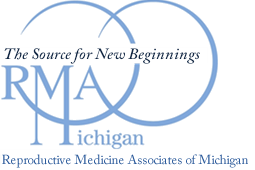Gestational Carrier
Gestational Carrier Fertility (Surrogacy) in Michigan
A gestational carrier (GC) is a woman who carries and delivers a child for another individual or couple. Unlike a traditional surrogate, a gestational carrier has no genetic connection to the baby.
An embryo is created using eggs and sperm from the intended parents or a donor(s) and is then transferred into the GC’s uterus on a future date.
Why Might a Gestational Carrier Be Recommended?
A fertility specialist may recommend a gestational carrier for several reasons, including:
- Absence of a Uterus: Due to hysterectomy or congenital conditions.
- Uterine Abnormalities: Such as severe fibroids, uterine scarring, or Asherman’s syndrome.
- Recurrent Pregnancy Loss: Multiple, unexplained miscarriages may lead to your provider recommending use of a GC.
- High-Risk Obstetric History: Prior second-trimester losses or multiple premature births that may make pregnancy unsafe.
- Medical Conditions:Some medical conditions pose substantial health risks for women during pregnancy, a GC may be recommended for conditions that make carrying a pregnancy unsafe.
- Social Surrogacy:You may elect to use a GC for personal, professional, or lifestyle reasons.
Michigan’s Legal Status: Effective 2025
Michigan’s Assisted Reproduction and Surrogacy Parentage Act make surrogacy agreements legal and enforceable. It repeals the state’s prior ban and allows intended parents and surrogates to enter agreements that can include compensation, provided statutory safeguards are met.
— Effective date: April 2, 2025 (signed April 1, 2024). Courts may issue pre- or post-birth parentage judgments.
Legal note: RMA of Michigan coordinates medical care and works with your selected agency/attorneys. This information is educational and not legal advice.
The Step-by-Step Process of Gestational Carrier
1
Embryo Creation
The first step in the process is embryo creation through IVF. You can create embryos before selecting a surrogate or while you are in the process of searching for one. The embryos you create will be frozen for a future transfer into a gestational carrier. PGT-A genetic testing is often recommended when using a gestational carrier to reduce the risk of chromosomal abnormalities and miscarriage.
2
Select a Gestational Carrier
Finding a gestational carrier can take several months. You may choose to work with a surrogacy agency to find a GC, who will help match you with candidates that meet the criteria for surrogacy. The agency will help facilitate necessary screening, escrow management, insurance review, and assist with legal representation.
You may also use a friend or family member; this is considered using an independent surrogate. RMA uses a third-party company to screen any independent candidates to ensure meets required medically advised criteria.
3
Medical and Psychological Screening
The gestational carrier candidate will undergo comprehensive medical evaluation to ensure optimal health. This includes review of previous medical records, a consultation with an RMA physician, and medical screening.
A psychological evaluation is also completed by the gestational carrier and intended parents to be sure all parties are emotionally and mentally prepared for the journey.
4
Legal Considerations
A legal contract between the gestational carrier and intended parents is required prior to an embryo transfer.
Each party should work with their own attorney who specializes in reproductive law. Both attorneys must be licensed to practice in Michigan. They can help guide you on the legal considerations associated with a surrogacy journey.
5
Embryo Transfer to the Carrier
The gestational carrier will complete an embryo transfer cycle where medications are utilized to prepare her uterus for a transfer. This could include birth control pills to synchronize her cycle and control the timing of a transfer, estrogen to help build the uterine lining, and progesterone to support the lining and pregnancy.
The embryo transfer will occur at RMA, where a thin flexible catheter is used to place the embryo. No anesthesia is required and discomfort should be minimal. During the transfer, the intended parents may be present with the gestational carrier’s consent.
6
Hormonal Support for Pregnancy
After the transfer, the gestational carrier will continue to take estrogen and progesterone, these medications are crucial to ensure a stable environment for the developing embryo.
A blood pregnancy test will be scheduled approximately 9 days after transfer, and if it is positive, the gestational carrier will continue medications to support the pregnancy.
7
Pregnancy Monitoring and Follow-Up
If the embryo successfully implants, the gestational carrier will undergo routine blood tests and ultrasounds to monitor progress of the pregnancy. The fertility clinic will supervise the carrier’s care for the first 8-10 weeks of pregnancy. After this monitoring period, the gestational carrier will transition to care under an obstetrician.
Role of RMA of Michigan in Gestational Carrier Cycles
At RMA of Michigan, a specialized team of fertility experts coordinates and supports all aspects of the gestational carrier process. Our approach ensures that both intended parents and gestational carriers receive the highest level of personalized care and attention. If an egg donor is involved, we also manage her medical care and cycle synchronization with that of the gestational carrier.
Customized Treatment Plans
Every gestational carrier cycle is unique, with treatment plans tailored to meet the medical needs and preferences of the intended parents and the carrier. Our team provides comprehensive guidance throughout the journey, from the initial consultation to post-transfer care
What to Expect at Your Initial Visit
The initial visit with our fertility specialists is a comprehensive session where we:
- Review your medical history and discuss any fertility challenges.
- Explain the gestational carrier process in detail, addressing legal, medical, and psychological aspects.
- Review of criteria for gestational carrier candidates to guide the intended parents in the carrier selection process.
- Develop a personalized timeline and treatment plan for all involved parties.
